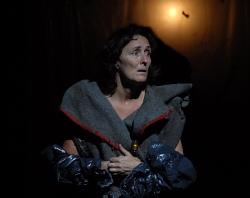Review - 'Mother Courage and Her Children' at the National Theatre
War is again under scrutiny in the National's new production of Bertolt Brecht's 'Mother Courage and Her Children'. Written in 1939, this play is regarded by many as Brecht's masterpiece, and by some as the greatest play of the twentieth century. With that kind of critical acclaim, the play has something of a 'must see', magnetic attraction about it.
The play is set in the first half of the seventeenth century during the 30 Years' War (1618-1648), one of the most destructive wars in European history. With most countries involved at one time or another, the war resulted in the devastation of huge areas of the continent as armies extorted or pillaged supplies from the innocent inhabitants and farmland in the areas they controlled.
The plot concerns one Anna Fierling (known as 'Mother Courage'). Anna and her three children, Swiss Cheese, Eiliff and Kattrin roam around Europe with their canteen wagon, making a living from selling goods to the army, or anyone else for that matter. Mother Courage is a focused business woman par excellence who thinks about little else than turning a quick profit. She spends almost all her time checking inventory, entering figures in her ledgers or in marketing activities.
Before the play even starts, there are already characters on the stage as well as technicians busying themselves with preparations, and bright lights blaze out across the auditorium. The technicians feature in other parts of the play, and musicians appear from under the stage and alongside the characters as the action unfolds. This is all part of a device often referred to as 'alienation' of the audience. Brecht's intention was to distance the audience from the usual illusion or spectacle of a theatrical drama in order to make them think more objectively about the characters, events and ideas in the play. The effect is also achieved with bright lights, large captions describing the 12 scenes and the simplicity of the set - canvass being the basic material used to define locations and buildings. Even Mother Courage's wagon is about as simple in its design as you could imagine.
There's a considerable amount of humour in this play - another Brechtian device - and much of it comes from Mother Courage herself. Talking about her children in scene 2, she says "raising children - easier to turn weasels into house pets". And talking to her mute daughter, she says "Be quiet always - that should be easy for a mute". But Charlotte Randle's excellent Yvette - a prostitute - also brings considerable humour to the piece, particularly when she rails against the cook who, she claims, ruined her.
Fiona Shaw presents us with an energetic and capable Mother Courage who is more than a match for most of the men she encounters. She easily convinces us of her business acumen but also arouses our sympathy as each of her children in turn become victims of the war.
Although 'Mother Courage and Her Children' is certainly not a pro-war play, it's not entirely clear that it's primarily an anti-war play either. Mother Courage trades to survive, and in a sense this is a play about survival against the odds in incomprehensibly harsh and cruel conditions. Though we can sit in judgement on Mother Courage's decisions and the consequences of her actions, in fact she's simply trying to survive in the only way she knows how - by buying and selling.
'Mother Courage and Her Children' is a classic of the twentieth century, and worth seeing on that basis alone. But this stimulating revival, directed by Deborah Warner, remains authentic to Brecht's ideas whilst injecting some creativity mostly in terms of the musical components provided by Duke Special and his band. Well worth seeing.
What the popular press had to say.....
BENEDICT NIGHTINGALE for THE TIMES says, "[Fiona] Shaw is a great actress, but she's more fire and air than earth — and it shows...Tony Kushner's adaptation combines with Warner's staging to catch war's unpredictability, fever, ferocity — and perverse magnetism." HEATHER NEILL for THE STAGE says of Fiona Shaw "It is a stunning performance." CHARLES SPENCER for THE DAILY TELEGRAPH says, "The show struck me as merely idiotic, full of sound and gimmickry, and signifying almost nothing." MICHAEL BILLINGTON for THE GUARDIAN says, "The good thing about Deborah Warner's revival is that it frees Brecht's play from pious reverence and releases its dynamic energy." FIONA MOUNTFORD for THE EVENING STANDARD says, "[Fiona] Shaw then gives a lucid, earthy account...but falling short of the role's towering greatness."
External links to full reviews from popular press
The Guardian
The Times
Daily Telegraph
Production photos by Anthony Luvera
Originally published on
